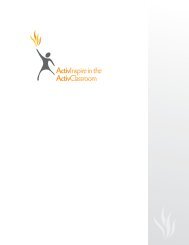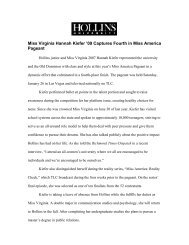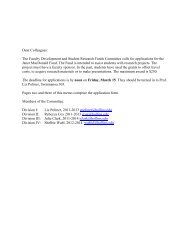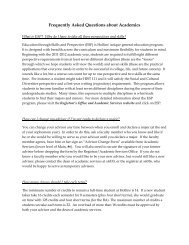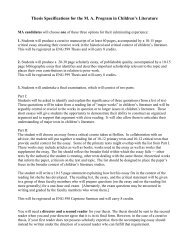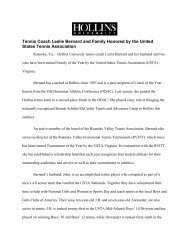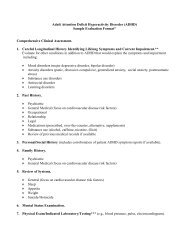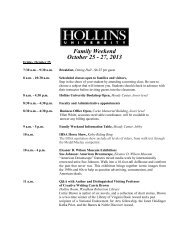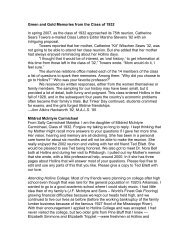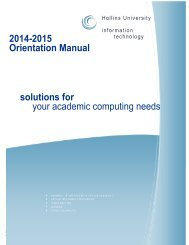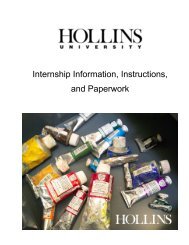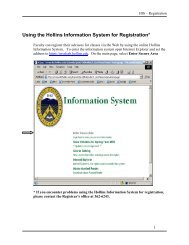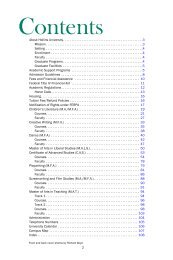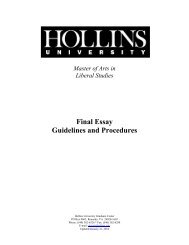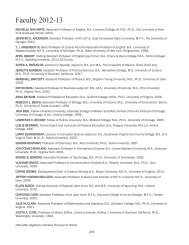ENGLISH & CREATIVE WRITING COURSE DESCRIPTIONS
ENGLISH & CREATIVE WRITING COURSE DESCRIPTIONS
ENGLISH & CREATIVE WRITING COURSE DESCRIPTIONS
Create successful ePaper yourself
Turn your PDF publications into a flip-book with our unique Google optimized e-Paper software.
eading, class, in our essays, and through experiential means, we will focus on form (page as plate), subject,<br />
tradition, meaning, and making. Placement to be determined during the summer.<br />
ENG 197F: FIRST‐YEAR SEMINAR ‐ THE NATURE AND CULTURE OF WATER (4)<br />
An exploration of the ways water runs through American nature writing. By close reading, writing, and<br />
fieldwork, we will examine and experience how authors integrate this “element” into their work, as well as the<br />
way water functions as myth, metaphor, ritual, resource, image, and form. The natural and cultural realities of<br />
our local and home watersheds will remain in focus as we consider how characters and authors reckon with the<br />
presence of water in their worlds. Placement to be determined during the summer. Also listed as ES 197F.<br />
ENG 197F: FIRST‐YEAR SEMINAR – WOMEN/ BODIES/ VOICES (4)<br />
This class works from the premise that “knowledge is power” to the conclusion that self‐knowledge leads to<br />
personal and community empowerment. Reading from a feminist perspective, we’ll think about how literature<br />
helps us better understand ourselves and our communities. Course texts include fairy tales, stories, essays, and<br />
novels by authors such as Margaret Atwood, Eve Ensler, Charlotte Perkins Gilman, Barbara Kingsolver, Robin<br />
McKinley, and Peggy Vincent. Also listed as GWS 197F. Placement to be determined during the summer<br />
ENG 197F: FIRST‐YEAR SEMINAR – WOMEN, HEALTH, AND CULTURE (4)<br />
Is it safe to go to the doctor? Is it important to play as hard as you work? In this seminar we investigate women’s<br />
health and leadership from multiple perspectives to explore what health means to us as individuals and as a<br />
culture. Together we will read and interpret a variety of texts (poetry, fiction, nonfiction, popular culture, and<br />
educational films), participate in workshops (yoga, self‐defense, climbing wall, and field trips), and develop<br />
personal plans for health and wellness. Placement to be determined during the summer. Also listed as GWS<br />
197F.<br />
ENG 197F: FIRST‐YEAR SEMINAR ‐ WOMEN, HEALTH, AND POWER (4)<br />
This course works from the premise that “knowledge is power” to the conclusion that self‐knowledge leads to<br />
personal and community empowerment. Reading from feminist perspectives, we will investigate issues such as<br />
fertility, mental health, body image, and sexualities. Placement to be determined during the summer. Also listed<br />
as GWS 197F.<br />
ENG 207, 208: ADVANCED <strong>CREATIVE</strong> <strong>WRITING</strong> (2, 2)<br />
A seminar in creative writing. May be repeated for credit. Seniors, with permission, may elect this course for<br />
four credits (ENG 407, ENG 408) each term during the senior year. Prerequisites: ENG 141, ENG 142, or<br />
permission.<br />
ENG 210: <strong>CREATIVE</strong> NONFICTION (4)<br />
This course focuses on the writing of creative nonfiction, including personal essays, memoir, and travel writing.<br />
Students will develop their writing through the process of sharing their work with others, reading a variety of<br />
authors, experimenting with new ways of writing, responding to each other’s work, and focusing on revision.<br />
The course is open to beginning as well as advanced nonfiction writers. Prerequisite: sophomore standing or<br />
permission.<br />
ENG 211: MULTICULTURAL WOMEN WRITERS (4)<br />
This course focuses on the work of several 20th‐century women writers whose work explores issues of culture,<br />
ethnicity, and American identity. Our discussions will address the following issues: how each character struggles<br />
to create a sense of female identity within the often conflicting influences of family and American culture; how<br />
authors respond to stereotypes of their cultural heritage; and how they depict the history of their group within<br />
the larger context of American history. Readings include a variety of authors from different backgrounds. We’ll



